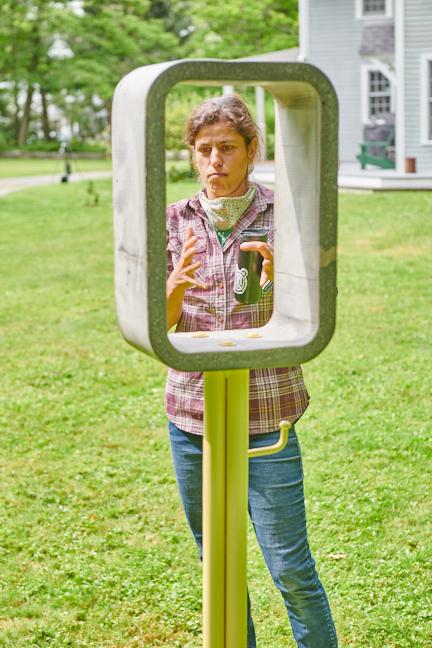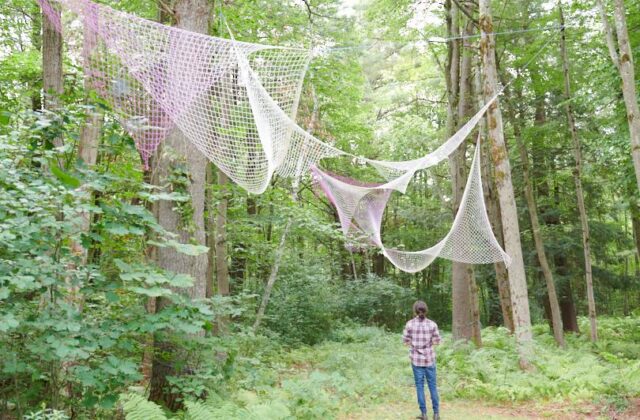Familiar and Ever So Slightly Askew
by Stephen Melville
Photos by Savage Frieze
In a pandemic summer that has greatly reduced the customary prominence of art and music in Norfolk, one bright spot briefly emerged this past month when Betsy Gill hosted a show of sculpture and installation by artist Sophie Eisner, daughter of longtime Berkshire residents Gil Eisner and Kate Wenner. Eisner holds a 2015 MFA from Cranbrook Academy of Art and currently teaches at Detroit’s College for Creative Studies. Her studio is in Detroit, but she found herself back in Southfield this summer with limited studio space and enough finished work intended for outdoor display to put together an exhibition that was both suitably distanced and happily distributed across the lawn, ranged along the house, and tucked into sheds and wooded nooks on Gill’s Laurel Way property.
About 70 appreciative visitors attended the show’s opening on a beautiful mid-August evening. Walking up the drive, they found themselves strolling among a dispersed grouping of yellow steel-frame figures whose geometry of circles and straight lines recalled exercises in books on how to render the human figure and more immediately read as ballerinas variously bending, stretching, and chatting in small groups (“For Degas,” 2013-20).
At the outer edge of this group, in the shadow of the house, stood another conversational piece (“Shhh, Don’t Tell,” 2020)—a more intimate coupling, as if of two people with flashlights under a shared blanket. In its range of materials—light bulbs, steel pipes, cast silicone—as well its way of bringing these elements together, the piece strongly evidenced Eisner’s current way of working by fabricating discrete objects that look both familiar and ever so slightly askew, and then assembling them into larger sculptural wholes.

Moving on through the show’s various spaces, one encountered, among other things, a bright orange briefcase with open metalwork sides standing atop two long legs, at once a person and their work (“Briefcase,” 2010-20); cast silicone forms equally reminiscent of vuvuzelas and small flagpoles hanging clustered to form a chandelier in an open shed (“Flagpole Chandelier,” 2017-20); a concrete block, its center empty, firmly bolted to a bright yellow stanchion with its own helpful-looking clothes hook, yielding something that bordered on a telephone booth or, as its title suggested, a variation on the view-framing telescopes one finds, or at least used to find, at roadside overlooks (“Lookout,” 2019). The extended dates assigned some of the pieces often point to different ways the core objects have been installed or assembled over time.
If most of the work had a distinctly anthropomorphic edge, other pieces—a bucket here, a table there, overhead a purple and white net stretched across a cluster of trees without becoming quite a canopy or marking out any simple trajectory—presented themselves as oblique entries into the context of embodied human use, off-center invitations to the practiced hand or eye.
It all made for an oddly nice and fitting event, masked figures passing among the sculptures, slipping bits of cloth aside for a sip of wine in the setting sun.
More of Sophie Eisner’s work can be seen at sophieeisner.com. In the summer of 2021 she will be an artist-in-residence at Mass MOCA in North Adams.

